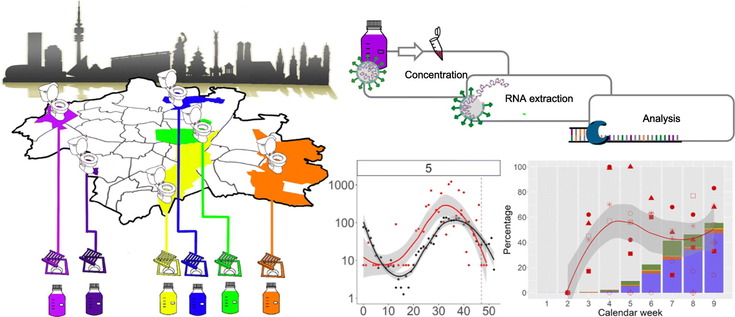COVID-19
Sewage monitoring as a pandemic early warning system for cities
21.07.2021
A research team now confirms the great potential of sewage monitoring as an early warning system for metropolitan areas, using the city of Munich as an example. The team led by the Tropical Institute at LMU Klinikum München has published the results of one of the first and so far longest sewage monitoring studies for the novel coronavirus in Bavaria in the journal Science of the Total Environment.
The scientists collected weekly wastewater samples at six locations in the Munich city area for over a year from the beginning of April 2020. The samples were analysed in the laboratory using RT-PCR (Reverse Transcription Polymerase Chain Reaction) and genome sequencing to measure the spread of SARS-CoV-2 in Munich over time and space. By decoding the genetic material by sequencing isolated viral RNA, the researchers also obtained information on whether variants of concern (VOC) occurred in the samples.

The results showed that the SARS-CoV-2 RNA load detected in the samples matched well with the official data of the 7-day incidence in the respective urban areas. Study leader PD Dr. med. Andreas Wieser from the Tropical Institute at the LMU Hospital reports: "Through the viral load measured in the wastewater, we detected the local incidence for the spread of SARS-CoV-2 already three weeks earlier than in the reporting figures of the authorities, which are based on the analysis of respiratory swabs. In addition, we were able to detect the increasing spread of the virus variant B.1.1.7 (Alpha) in the Munich population as early as the beginning of January 2021, weeks before it was detected by sequencing swab sample
Overall, the one-year follow-up study in the Munich urban area confirms the potential of sewage monitoring as an early warning system for the SARS-CoV-2 pandemic and the advantages compared to mass testing by swabbing. This is especially true with regard to the spread of virus variants of concern in the local population. In addition, wastewater sampling has fewer biases, e.g. due to changes in sampling rules or reporting pathways, than smear/report data-based statistics.
Original Publication:
Spatially resolved qualified sewage spot sampling to track SARS-CoV-2 dynamics in Munich - One year of experience.
Rubio-Acero R, Beyerl J, Muenchhoff M, Roth MS, Castelletti N, Paunovic I, Radon K, Springer B, Nagel C, Boehm B, Böhmer MM, Graf A, Blum H, Krebs S, Keppler OT, Osterman A, Khan ZN, Hoelscher M, Wieser A; KoCo19-Study Group.
Sci Total Environ. 2021 Jul 21;797:149031. doi: 10.1016/j.scitotenv.2021.149031.

